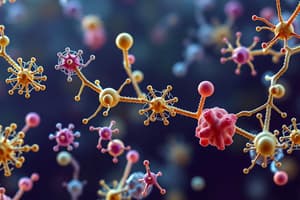Podcast
Questions and Answers
Which level of biological organization includes all other levels?
Which level of biological organization includes all other levels?
- Biosphere (correct)
- Ecosystem
- Community
- Organism
Which process allows living organisms to maintain a stable internal environment?
Which process allows living organisms to maintain a stable internal environment?
- Evolution
- Adaptation
- Homeostasis (correct)
- Metabolism
What is the fundamental unit of life in biological systems?
What is the fundamental unit of life in biological systems?
- Cell (correct)
- Organelle
- Tissue
- Molecule
Which of the following biological disciplines focuses primarily on the study of heredity and variation?
Which of the following biological disciplines focuses primarily on the study of heredity and variation?
Which of the following describes the role of DNA in a cell?
Which of the following describes the role of DNA in a cell?
What is a key characteristic of evolution?
What is a key characteristic of evolution?
Which of the following is the most inclusive level of organization in the list?
Which of the following is the most inclusive level of organization in the list?
In what way, does adaptation support evolution?
In what way, does adaptation support evolution?
Which field of study focuses primarily on the energy conversion within plant cells?
Which field of study focuses primarily on the energy conversion within plant cells?
What role do decomposers play in nutrient cycling?
What role do decomposers play in nutrient cycling?
In the scientific method, what is the immediate next step after formulating a hypothesis?
In the scientific method, what is the immediate next step after formulating a hypothesis?
Which of the following best describes the study of community ecology?
Which of the following best describes the study of community ecology?
What is an accurate description about a hypothesis in the scientific method?
What is an accurate description about a hypothesis in the scientific method?
Flashcards
Ecology
Ecology
The study of interactions between organisms and their environment.
Photosynthesis
Photosynthesis
The process by which plants convert light energy into chemical energy in the form of glucose.
Cellular Respiration
Cellular Respiration
The process by which cells break down glucose to release energy.
Nutrient Cycling
Nutrient Cycling
Signup and view all the flashcards
Scientific Method
Scientific Method
Signup and view all the flashcards
Levels of Biological Organization
Levels of Biological Organization
Signup and view all the flashcards
Cells
Cells
Signup and view all the flashcards
DNA
DNA
Signup and view all the flashcards
Evolution
Evolution
Signup and view all the flashcards
Homeostasis
Homeostasis
Signup and view all the flashcards
Metabolism
Metabolism
Signup and view all the flashcards
Adaptation
Adaptation
Signup and view all the flashcards
Study Notes
Introduction to Biology
- Biology is the scientific study of life and living organisms, encompassing their structure, function, growth, origin, evolution, and distribution.
- It's a broad field encompassing many sub-disciplines such as botany, zoology, microbiology, and genetics.
- Biology explores diverse topics, from the minute workings of cells to the intricate interactions within ecosystems.
- Key aspects of biology include: observation, experimentation, analysis, and the formulation of theories that explain biological phenomena.
Levels of Biological Organization
- Biological systems are organized in a hierarchical structure.
- Atoms combine to form molecules.
- Molecules combine to form organelles.
- Organelles combine to form cells.
- Cells combine to form tissues.
- Tissues combine to form organs.
- Organs combine to form organ systems.
- Organ systems combine to form organisms.
- Organisms interact to form populations.
- Populations interact to form communities.
- Communities and their physical environment form ecosystems.
- Multiple ecosystems make up the biosphere.
Key Concepts in Biology
- Cells: The fundamental units of life. All living organisms are composed of cells.
- DNA and Genes: Genetic material responsible for heredity and development. DNA contains the instructions to build proteins, which execute many functions in the body.
- Evolution: The process by which populations of organisms change over generations. Driven by mechanisms such as natural selection.
- Homeostasis: The maintenance of a stable internal environment in an organism. Essential for survival.
- Metabolism: The chemical processes within a living organism. These processes encompass energy production and utilization.
- Reproduction: The creation of new organisms, essential for the continuation of a species. Can be asexual or sexual.
- Heredity: The transmission of genetic material from one generation to the next.
- Adaptation: The process by which organisms develop features that enhance their survival and reproduction in specific environments.
Branches of Biology
- Botany: The study of plants, including their structure, function, and evolution.
- Zoology: The study of animals, dealing with their anatomy, physiology, behavior, ecology, and evolution.
- Microbiology: The study of microorganisms, including bacteria, viruses, fungi, and protists.
- Genetics: The study of genes, heredity, and variation in organisms.
- Ecology: The study of interactions between organisms and their environment.
- Physiology: The study of the functions of living organisms and their parts.
Biological Processes
- Photosynthesis: The process by which plants convert light energy into chemical energy in the form of glucose.
- Cellular Respiration: The process by which cells break down glucose to release energy.
- Nutrient Cycling: The continuous movement of nutrients through the environment.
- Population Dynamics: The changes in population size over time.
- Communities: Interactions within and between different species in an area. Competition, predation, mutualism, etc.
Scientific Method in Biology
- Observations are made about natural phenomena.
- Hypotheses are formed to explain those observations.
- Experiments are designed and conducted to test the hypotheses.
- Data is collected and analyzed.
- Conclusions are drawn from the data. These conclusions can support or refute the hypothesis.
- When supported by repeated experiments, a hypothesis may become a scientific theory.
Studying That Suits You
Use AI to generate personalized quizzes and flashcards to suit your learning preferences.




